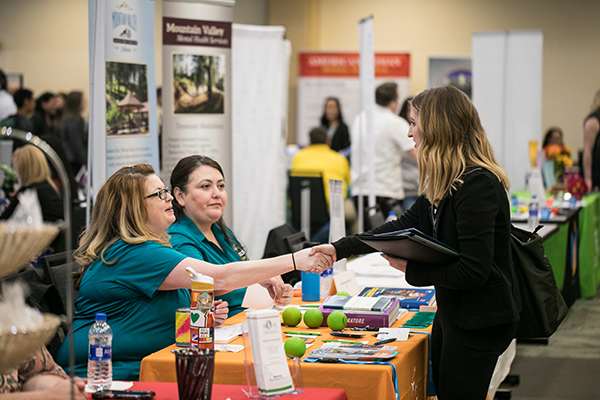 During the Education and Social Impact Career Fair on April 15, students, alumni and community members had the opportunity to meet with more than 100 employers. (Sacramento State/Andrea Price)
During the Education and Social Impact Career Fair on April 15, students, alumni and community members had the opportunity to meet with more than 100 employers. (Sacramento State/Andrea Price)Sacramento State’s College of Education and Career Center took aim at a two critical issues – a shortage of teachers and overall lack of diversity in the profession – during two on-campus events Monday, April 15.
The first, a panel discussion, brought to campus teaching alumni to share their professional experiences. The second, the annual Education and Social Impact Career Fair, allowed current students, alumni and members of the public to meet directly with representatives of school districts, charter schools and nonprofit organizations – and in some cases walk away with job offers.
The panel featured a diverse group of teachers who shared their experiences while emphasizing that individuals from underrepresented backgrounds can succeed in the profession. The career fair connected students and alumni directly with school districts, charter schools and nonprofits, many of which held in-person interviews on site.
Both events were designed to correct misconceptions about profession and introduce the career to students who may not have considered it.
“For the candidates in our program, it’s an amazing opportunity to find out about districts all across California and even, sometimes, outside of California,” said Stephanie Biagetti, the College of Education's credentials program chair. “There are also students who are on the fence. ... They may not know much about it, and they want to hear more about the career.”
The panel discussion was part of the University’s “Be a Teacher, Make a Difference” campaign, which includes a video series featuring teaching alumni sharing their stories.
Two changes for this week’s event were designed to broaden its scope and impact. First was inclusion of the panel discussion, which was new for this year. The second was renaming and refocusing the career fair to include nonprofit organizations. The fair previously was focused primarily on teaching.
“We noticed that students, when they’re trying to decide what they want to do when they leave here, mention, ‘I want to help people, I want to make a difference,’ ” said Denise Hamilton, experiential learning coordinator and career counselor with the Sacramento State Career Center.
“That led to the social impact component of this, to expose students to more opportunities as to how they can make a difference in their community, whether it’s through education or nonprofit work.”
A major goal of the panel and the career fair was to correct student and recent-alumni misconceptions about teaching. Chief among them is the belief that the profession offers insufficient compensation and job security. That might be because they were in K-12 schools during the Great Recession and witnessed mass layoffs and turnover firsthand, Hamilton said.
But with the economy doing well and teachers in high demand nationwide, she said, those issues have largely to subsided.
The career fair featured 107 employers, including districts from as far away as Palm Desert and Tahoe-Truckee, with several others on the wait list. Several attendees walked away with job offers or promises of a second interview. About 300 individuals attended the fair.
During the panel discussion, Sacramento State alumni shared why they became teachers, talked about misconceptions and challenges, and offered advice to students interested in teaching.
Stephanie Coleman, an education specialist at Cordova High School, told audience members the path to becoming a teacher – the years spent earning a credential followed by the initial years in the classroom – are difficult but ultimately worthwhile.
“You have power to make a difference in the world that no one else can, and I don’t say that lightly,” Coleman said. “I truly believe that teachers are the biggest influence in changing our world for the better.”
Roughly half of all California teachers are alumni of California State University, and Sacramento State is the largest producer of teachers in the Sacramento region. That gives the University, through its myriad programs and events, a tremendous opportunity to positively affect the profession, in Sacramento and beyond.
“We are fueling the community with quality educators from the credential program,” Hamilton said. “By encouraging students to consider this profession, we are in turn helping to build a stronger educational community for the Sacramento region that will then be educating our youth in the next generation.” – Jonathan Morales
